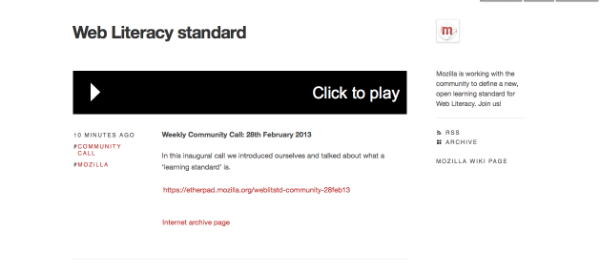Thinking through the Web Literacy standard arc.
Update: For the latest information on the Web Literacy standard work, head to http://mzl.la/weblitstd
TL;DR version: Mozilla is working on a new, open learning standard for Web Literacy. We’ve got weekly community calls and a blog to help us come to a consensus on what we need and what such a standard will look like. Our first target is the Mozilla Festival in October where we hope to have organisations that have aligned with the standard, as well as some Mozilla-devised learning activities, assessments, widgets, pathways and badges available.
Working in a distributed way at Mozilla is an interesting experience. We, of course, have strategies and roadmaps and an element of top down decision-making, but by and large there’s a great deal of consensus-making that goes on. Over the next few months we’re going to be learning on that experience to engage the community in coming up with a new, open learning standard for Web Literacy. If you’re unsure why we need such a standard, you might like to check out some of my previous posts on the topic.
If you’re at all familiar with how formal, technical standards are constructed then you’ll be aware that it’s often a multi-year process with much to-ing and fro-ing. While that’s absolutely necessary for a technical of standard, we’re hoping to foreshorten the process significantly in our attempt to define a learning standard for Web Literacy. Essentially, what we need is something that works well enough for those who would like to align with it. We can (and indeed, should) iterate as the Web evolves.
While I’m unwilling to put hard and fast dates on the following, these are the four steps we believe the community needs to work through in the medium-term to get to an alpha version of the standard:
- Outcomes: What are our desired outcomes (and audiences)?
- Categories: Are our current 4 categories enough?
- Assessing & Sharing: How do we scale this standard?
- Building: Here’s the framework—what should we add or remove?
What I can say is that to have time for testing, for organisations to have time to think about how they will align, and for Mozilla to build the learning activities, assessments, widgets, pathways and badges we’re planning to build, then we need to get a consensus around this pretty quickly. Happily, the work that we’ve done previously seems to be a good base for this discussion. And so it should be – that framework was itself created after interviewing with a number of smart people and some research into the literature.
I’m very much looking forward to what Mozilla can create with the community over the next few months. If you’re interested in this work, may I suggest that you follow the new Web Literacy standard blog and, if possible, join our weekly calls? You’d be very welcome and you need no qualifications (other than an interest in the area) to get involved!
Image CC BY-NC sandcastlematt



